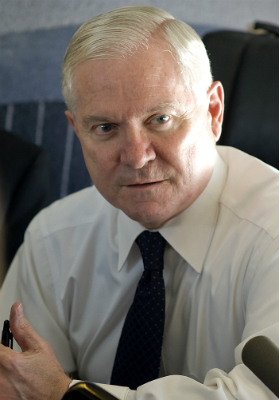The Gates files (II): Some revelations and tidbits about the Bush 43 administration

Almost all the media
attention devoted to Robert Gates's lively new memoir, Duty, is about
his criticisms of Joe Biden and other members of the Obama administration. But
there is lots more to it.
Let's start with
some insights from the first part of the book, about his time in the last two
years of the Bush administration.
To understand Dick
Cheney, it is necessary to remember that he served in the White House during
the Ford years, which Gates terms "the nadir of the modern American
presidency."
The best
questioner on the Iraq Study Group (a congressionally mandated review in the
fall of 2006) was Sandra Day O'Connor, who had little experience in national
security issues. "It was extraordinary to listen to her. From her years as a
Supreme Court justice, she had an amazing ear for faulty logic, questionable
evidence, inconsistency, and flawed analysis."
Gates states that
on Nov. 5, 2006, when he first discussed becoming defense secretary with
President Bush, that Bush told him he was looking at replacing Gen. George
Casey in Iraq with Gen. David Petraeus. This is a month earlier than I have
seen Petraeus mentioned as being on Bush's mind as Casey's replacement.
At his
confirmation hearing, listening to senators complain and fight, he thought to
himself, "I have walked right into the middle of a category five shitstorm."
He considered the
post-invasion handling of Iraq to have been "amazing bungling." Unusually for
this book, he doesn't name names.
When President
Bush told the Joint Chiefs on Dec. 13, 2006, that he was considering a "surge"
of troops to Iraq, "All of the chiefs unloaded on him." Gates, who was in the
room but not yet confirmed as defense secretary, "was struck by the service
chiefs' seeming detachment from the wars we were in."
When he travelled
to Baghdad a few days later in a C-17 with a small trailer inside it for him to
sleep in, "it was a lot like being FedExed halfway around the world."
In Baghdad, he met
with Ray Odierno, then the no. 2 officer in Iraq, who "warned me regarding
Casey's plan" for the way forward in Iraq.
Marine Gen. Peter
Pace was dumped as chairman of the Joint Chiefs after two years because of the
number of Republican senators (Warner, Chambliss, Graham, and McCain) who said
they would not like the idea of renominating him because it would turn into a
review of Iraq policy at a time when Republicans were sick of defending the
Bush administration's handling of that war. "I had, for all practical purposes,
sacrificed Pete Pace to save the surge. I was not proud of that."
President Bush, in
a discussion of Iraq policy in mid-2007, turned to Gates and said, "Somebody
has got to be risk-averse in this process, and it better be you, because I'm
sure not."
Iran was paying
Iraqi legislators $250,000 each to vote against the Status of Forces Agreement
with the United States, Petraeus told Gates.
(Much more to come)
Published on January 14, 2014 07:53
No comments have been added yet.
Thomas E. Ricks's Blog
- Thomas E. Ricks's profile
- 436 followers
Thomas E. Ricks isn't a Goodreads Author
(yet),
but they
do have a blog,
so here are some recent posts imported from
their feed.



